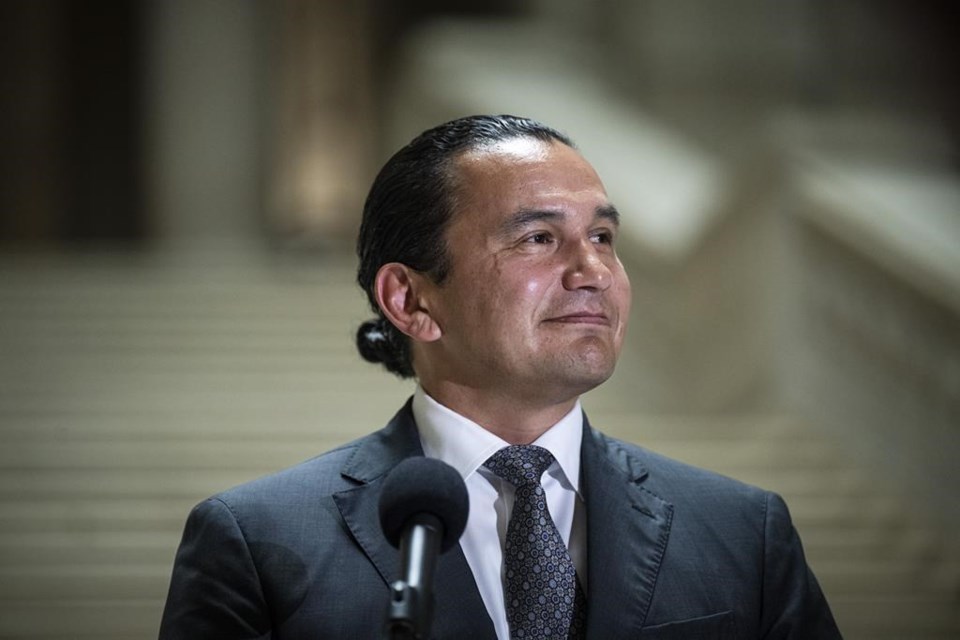WINNIPEG — When Manitoba Premier Wab Kinew took the unconventional move of appointing himself the minister responsible for Indigenous reconciliation, he did so with the intent of strengthening the relationship between the province and Indigenous communities.
First Nations and M√©tis leaders have said that relationship soured during the previous government's seven years in power.¬Ý
It seemed like a "natural fit" to include Indigenous governments when looking at making positive bonds with other orders of government, said Kinew, Manitoba's first First Nation premier, in an interview with The Canadian Press this month.¬Ý
"I'll be doing engagement, relationship-building and defining how we're going to move forward in a good way with Indigenous nations," said Kinew, who was raised as a young boy on the Onigaming First Nation in northwestern Ontario.
It has been a long-standing practice that the premier take on the role of minister of intergovernmental affairs working with federal and municipal governments. But by taking on the Indigenous reconciliation portfolio, Kinew said during his Oct. 18 swearing-in he wanted to send a message to Indigenous leaders that the newly elected NDP government would treat First Nations and M√©tis governments with the same "level of seriousness" as other governments.¬Ý
The move was met with measured optimism from First Nations and M√©tis leaders.¬Ý
–°¿∂ ”∆µern Chiefs' Organization Grand Chief Jerry Daniels said having the premier take on the role of Indigenous reconciliation minister shows restoring relationships between the two groups is a priority.¬Ý
"I don't think previous premiers would have even taken it to that level, and I think that's an example for the country," he said.¬Ý
Grand Chief Cathy Merrick, of the Assembly of Manitoba Chiefs, said First Nations governance includes clan and kinship systems that predate provincial and federal governments. She said Kinew's recognition of Indigenous governments and decision to take on the reconciliation portfolio holds "significant weight."
"It's very uplifting to be able to hear a premier actually appoint himself to this position to be able to establish that relationship that wasn't really there with the previous government."
The former Progressive Conservative government led by premiers Brian Pallister and Heather Stefanson had a contentious relationship at times with Indigenous governments.¬Ý
In 2017, Pallister caused outrage after saying the issue of hunting at night with a spotlight was becoming a "race war" between Indigenous and non-Indigenous hunters.¬Ý
The Tories issued a directive in 2018 to Manitoba Hydro forbidding the Crown-owned utility from forging any benefit agreements with the Manitoba M√©tis Federation and other Indigenous communities.¬Ý
At the time, Pallister had an agreement between the utility and the federation cancelled that would have seen the M√©tis government receive tens of millions of dollars in return for not opposing hydro projects.¬Ý
Some Indigenous leaders expressed hope after Heather Stefanson took over as premier in 2021, and said it was a priority to repair Manitoba's relationship with Indigenous communities.¬Ý
However, when Stefanson and her party refused to support the search a Winnipeg-area landfill for the remains of two First Nations whose remains are believed to be there, and then campaigned on that decision during the provincial election, it had many Indigenous leaders call for a new government.¬Ý
While several Indigenous leaders say they are hopeful that relationships can be repaired with the new NDP government, part of that will include changing the mindset of lower-level government employees.¬Ý
Manitoba M√©tis Federation President David Chartrand said the federation, which is recognized as the national government of the Red River M√©tis, is often viewed as an advocacy group by bureaucrats.¬Ý
The federation has a "proficient democratic system" that dates back to the early 1800s, but is still seen as lesser when sitting across the table from different levels of Canadian governments, Chartrand said.¬Ý
"We are government and hardworking people, and we have our own governmental institution of democracy. They need to respect that."
Kinew has confidence civil-service employees will work with Indigenous governments, since he said many of them urged him to add Indigenous reconciliation minister to his portfolio.
He said some expressed confusion in the past about who to speak with regarding First Nation and M√©tis issues.¬Ý
"Once I heard that the desire that we have to build strong relationships and recognize the importance of Indigenous governments would also help the provincial government to do its work more effectively, that's when we really lock in the plan," he said.¬Ý
Kinew added his government will "empower" civil servants to work toward reconciliation, pointing to his decision to revoke the previous government's hydro order.¬Ý
First Nations leaders say they are curious to see how the new government will address land sovereignty, economic resource sharing and issues around murdered and missing women and girls, and child welfare.¬Ý
¬ÝKinew said his focus will be on relationship-building while some of the more procedural issues with be left with ministers.¬Ý
"There is an expectation that every minister and every cabinet committee will incorporate Indigenous issues and their perspective on reconciliation into the work that they do."
Part of that includes creating an Indigenous economic development portfolio. Minister Ian Bushie has been mandated to advance economic reconciliation by partnering with new and existing Indigenous developments.¬Ý
The province is also developing a new framework for Crown consultations with First Nations and Métis communities to replace the current one established in 2009. Kinew hopes to see that done in "months, not years."
Grand Chief Garrison Settee, of Manitoba Keewatinowi Okimakanak, said previous provincial and federal governments have diminished a nation-to-nation relationship, but he's confident this can be corrected.
"Right now we have this opportunity to forge a new relationship with a new government and forge a new path forward for our people."
This report by The Canadian Press was first published Nov. 18, 2023.
Brittany Hobson, The Canadian Press




